Text
Acceptance and Actions
Happy Autism Acceptance Month!
__
‘The past few years, I’ve always tried to put a lot of effort into educational/informational posts during April. As always, it gets exhausting.
There is so much negativity around autism. Society paints our existence as a tragedy- portrayed as something to be feared, focusing only on the difficult things.
Is being autistic difficult?
Yes, it is – especially in a world that’s not built for you, that sees you as less. Having a body that doesn’t always cooperate isn’t exactly helpful either.
__
That said… there’s a lot of joy and beauty that comes along with autism. You know – just like any other human experience.
Being in the presence of my fixations and special interests?
It’s having some stability in a chaotic world, somewhere I can take solace in.
Flapping hands and bouncing around?
It’s the feeling of overwhelming joy, the need to move because I cannot contain it within.
The excitement that fills my soul from the things people rarely give a second glance to?
It’s wonderful to find happiness amongst the mundane.
If others understood that joy, maybe we would have a much nicer Autism Acceptance month.
__
Growing up, I never thought I would experience acceptance. Trauma made me feel like that was impossible, and that I was broken.
But now that I have a support system, access to better communication options, and people who love both me and all my weirdness?
I was never broken or “bad at being a human.” I was just autistic, and needed more supports to thrive.
What I needed was acceptance – radical acceptance.
Acceptance to me feels like:
Having fun with friends. Not because they feel obligated to or for a program, but simply because they want to spend time together.
Loved ones who know what things delight and soothe my sensory system, happily sharing what they find.
Pets that love me unconditionally.
A loving and supportive partner, who accepts my communication and access needs.
Classmates who value my input and ideas, and actively want me involved.
Direct support professionals who ensure both my autonomy and safety, giving me the dignity of risk and the ability to enjoy being in my community.
People who push for change; those that fight for better supports, respite for families, accessibility, employment, housing, and so much more.
__
Acceptance isn’t ignoring the difficulties.
It’s learning to embrace who I am as a person, knowing that life is a beautiful thing – even if it deviates from the norm.
It’s learning to understand what I need, figuring out how to advocate for myself – even if my self-advocacy is simply saying “no.”
It’s others learning that different is not such a terrible thing after all, and that different is valuable.
Acceptance, in its many forms, is an action.
- Courtney Johnson, @justkeepstimming
3 notes
·
View notes
Text
Year Seven
Content note for the Day of Mourning, filicide, and a much longer post than I meant to write.
On March 1st, we participated in the Disability Day of Mourning to honor disabled victims of filicide. Every year, a new list of names is shared – adding to the hundreds of names that has been gathered by The Autistic Self Advocacy Network over the years.
And yet, there are names and stories that we will never know. Never reported, acknowledged, or shared.
___
Disability is a natural part of the human condition. It’s not a tragedy or a fate worse than death. Every person is an integral part of the interconnected life we live – by the things they create, the influence on those around them, or the love they hold for the things that give them joy.
Our worth is not measured in salaries, degrees, or suspected IQ points. Life is sacred in whatever path lies before us – even if it’s not expected or the “norm.” The beauty of life often lies in the mundane.
_____
This was my seventh year as a site coordinator for the Disability Day of Mourning vigil. It never gets easier. As I put together a slideshow each year, I look through the photos and their stories.
I see babies as young as one day old, and I wonder what kind of life they could’ve lived. I think of all the things taken away from the young names on the list, robbed of those little moments as we grow.
The warm feeling of sunlight through a school bus window or the comfort in the presence of those we love during a winter storm outside – would they have experienced such things?
What joys would have filled their soul with delight?
What would they have been like as an adult?
_
I see elders over one hundred years old – and I imagine what kind of life they lived. Even in their older years, life was still there to be experienced.
How did they like their coffee – or did they even drink coffee?
Did they have any regrets?
Was there something they were looking forward to?
_____
A list of names doesn’t tell you everything.
It doesn’t tell you that 4 year old Madelin’s favorite color was blue and adored her collection of stuffed animals.
You can’t see that 84 year old Patricia had 8 great-grandchildren – or the joy of 6 year old Leon when he was surrounded by bubbles.
It can’t describe how much 73 year old Mary loved scrapbooking and watching the Guardians of the Galaxy.
We don’t get to see why 35 year old Jack was described as an incredibly loving person, or the art of 17 year old Morgan who dreamed of going to Japan one day.
It doesn’t tell you that little 2 year old Lola was a joyful toddler with a love for butterflies and the outdoors – or that 9 year old Amanpreet loved visiting the park, playing in the swings.
We don’t know what books 63 year old Cheryl was happily reading. We will never see 82 year old Joan’s rose garden.
We don’t get to know 7 year old Lucas’ favorite character in Star Wars, or 12 year old Rosa’s favorite shade of pink.
Names alone can’t tell you that 5 year old twins Ahmad and Ava were in kindergarten; how Ahmad was talkative and outgoing while Ava was known as a quiet observer.
_____
All these years, I’ve never been able to understand these deaths. I can’t explain it, nor can I explain society’s painting of our existence as a burden.
When my youngest brother died in 2018, the remnants of my grief were constantly countered with “encouragement” of strangers, who never actually had the privilege to meet sweet Liam.
Being told we were better off without him as a burden was pure salt in the wound. Over 6 years later, the sting still remains – as does the real burden: grief.
__
The arguments of a lack of supports fall flat as parents all over struggle with the same – and yet never harm their children like this.
The tragedy lies not in the disability, but the violence from the hands of those who the victims should have been able to trust the most.
I don’t have the words to describe the ache I feel in the photos and stories.
But what I can tell you is this:
Disabled lives are worth living.
-Courtney Johnson, @justkeepstimming
1 note
·
View note
Text
Celebrating
Many autistic people have their ‘special interests’ or ‘hyperfixations.’
Doctor Who was mine. It still is.
The idea of exploring time and space, the concept of all life being valuable and sacred, the moral questions the show raised – I adored it all. In a very traumatic time in my life, the show was one of the things that kept me grounded. It gave me hope that life was worth living, seeing joy in both the mundane and unknown.
__
Even more, it impacted my life in ways that I genuinely never expected:
It exposed me to cultures and concepts beyond my small southern town – places we had never learned about and definitely never expected to go.
It provided an avenue for friendships, forged online through our shared love for the show. These friendships became chosen family – and in one particular case, my love and my other half.
It made me feel like I could be brave and take risks, even if I’m scared. Traveling through time and space is dangerous and risky – but growing up can be too.
It gave me the understanding and acceptance that even though I’ve changed, I’m still the same person. Brain injury and chronic illness transformed a lot of how I exist these days.
The transition to using a wheelchair, using a communication device, needing medical support – my body does not work the same way as it once did and feels unknown to me. But yet, I am still myself.
It might’ve started out as a mild curiosity in a junkyard, but it really has turned into a spirit of adventure in its own.
And my life is so much better for it.
-Courtney Johnson, @justkeepstimming
1 note
·
View note
Text
Misconceptions
Content note: child death.
I was once asked, “what’s a misconception people have when they look at you, as an autistic AAC user? What do they not see?”
Honestly, I could’ve answered with many things – and I generally respond with my advocacy scripts that I’ve carefully crafted over time. Things like “not seeing my autonomy” or “not presuming competence” are usually among the basics.
But today, I’m straying off the script.
__
The things that people miss the most?
How intensely I experience and feel things, and how I can’t always express that in everyday conversation.
There’s this false sense of expectation that you must have speech to convey emotions.
Of course, that’s not true. Speech is not a requirement for the observation of life.
I find life beautiful, despite often struggling to want it for myself. Seeing others living different lives, many stories I’ll never know of; I always wonder about the people I pass every day, hoping they’re doing okay.
I remember seeing it best described in a show I once watched, where life was compared to a candle – each flame being unique and how they can’t be replaced once extinguished.
I think about that often.
__
And yet – five years ago on this past September 17th, one of the most beloved flames went out when we lost my baby brother. Autistic, nonspeaking, also a fan of planes and music – just like me. He had even finally started to use his communication device to share all about his love of Legos.
He was only 7.
I’ve posted about him before, and I’m sure I will again.
Sometimes I feel like a broken record, a skipping CD that you can’t seem to repair no matter how many times you clean it. I worry about making others sad, but then again – part of me fears that if I cease to mention him, he might be forgotten. My mind wanders, contemplating how his death might’ve been prevented by the medical system – if they hadn’t dismissed and sent him home.
Was it a lack of awareness? Little training about autism? Not taking concerns seriously? All three?
__
When you’re an AAC user (or even autistic in general), people often assume you aren’t affected by things or that it doesn’t impact you – especially if you react in a way that they don’t “expect”.
Autistic people often process trauma differently – sometimes by being very quiet, loudly stimming, seeking connection any way they can, being angry, or even laughing. It can be hard to control our body’s expressions overall, but especially during a heightened emotional state.
Grief is confusing like that.
Like I’ve said before, it doesn’t have a singular look. It’s a complex and tangled mess of emotions, regardless of your neurotype. Grief is hard to navigate, and comes overwhelmingly in waves.
And when it happens, it’s hard for anyone to communicate such a strong emotion.
-Courtney Johnson, @justkeepstimming
0 notes
Text
Lifelines: Direct Support Professionals
Once again, I recently said goodbye to another wonderful caregiver. I’m very sad to see her go, but I also understand. She’s going into nursing school and I know she’s going to do great.
When she left, she sent me a goodbye present that I’m very grateful for – a package with recipes/instructions and some Bluey stickers.
_
Direct support professionals play a crucial role in the disability community. For many of us, they are a lifeline to stay in the community instead of institutions while still getting the care we need.
They help manage medications, support us with daily living, and help us socialize. Because of them, we get to appointments on time and get to eat meals that aren’t lunchables. We learn new life skills and find things that we never knew we would enjoy.
They provide a moment of respite for families, allowing for our loved ones to take a breath. The supports help ease our families’ anxieties – especially if they feel that we are in good hands.
These services are absolutely essential for people with disabilities and our families. For those of us with complex medical conditions, sometimes having a direct support professional is even a literal life saver.
And yet, they’re not given the support that they need themselves.
___
We know that home/community-based services often have long waitlists, but what about when we’re finally approved?
Many places have a significant shortage of support staff to the point where it’s honestly a crisis. I know so many families who are struggling to find help, despite being “approved” for supports. Families go through all the red tape and hoops to get approved – only to find that the help they needed isn’t even there.
__
Direct support professionals aren’t given the credit they deserve from the system – and insincere praise or ableist pity does *not* count. Our caregivers deserve to have a living wage. They need comprehensive training/support, benefits, and more. Support staff are not glorified babysitters for people with disabilities; they are an integral part of our inclusion in society.
DSPs need to be seen as a part of a valued profession, not a temporary position until they can find a career that actually pays the bills or provides health insurance. It’s not fair to them or us – and it needs to change.
-Courtney Johnson, @justkeepstimming
1 note
·
View note
Text
Happy Disability Pride Month!
Yes, pride!
For a lot of people, the idea of people being ‘proud’ of their disabilities can be a little confusing. Our society often sees disability as something to be afraid of – or to avoid entirely.
For a long time, people with disabilities were pushed away from public view.
Institutions like Willowbrook were overcrowded with people who were considered “mentally defectives” – many with developmental disabilities who were traumatized in the facilities.
As for public access and employment?
It was almost unheard of.
__
The Americans with Disabilities Act (ADA) was signed into law on July 26, 1990.
Because of this, Disability Pride Month takes place in July.
The ADA was a historic moment for the disability rights movement, and fought hard for by many people with disabilities and our allies.
It essentially gave us more of a right to exist in public, helping to ensure access to the world around us – and provided (some) legal protection against discrimination.
The ADA supplemented and strengthened other important disability laws and decisions – like Section 504, and laws that allowed people with disabilities to access a public education.
It also helped pave the way for similar laws to protect tenants with disabilities (within the Fair Housing Act) and travelers with disabilities (the Air Carrier Access Act).
From the Capitol Crawl to the 504 Sit-Ins, people with disabilities have fought hard for our right to exist – just as we are.
And of course, the fight is ongoing.
__
Despite the Americans with Disabilities Act being law, non-compliance and barriers often still remain. The ADA is a lifeline in many ways, but it exists in a precarious position – especially in today’s climate.
People don’t always realize the things the movement fought for – or what still goes on today.
Being denied access to places, to safely attend public school, use public transportation, or the right to work? These things still happen.
Things like “ugly laws,” which meant police could arrest people just for being disabled in public? Now, it’s estimated that a significant portion of people killed by law enforcement have a disability – with Black disabled people being at higher risk.
Eugenics programs such as forced sterilization?The practice still continues today for some people with disabilities – especially to those who are BIPOC, those considered “incompetent,” and people who are incarcerated or detained.
Not being able to safely access transportation? This is still highlighted by inaccessible stations and the fears of airlines destroying lifesaving medical equipment and wheelchairs.
Abuse in institutions? This trauma remains today in places like the Judge Rotenburg Center, many psychiatric hospitals, and some group homes.
And yet, these are only some of the barriers to be addressed. We still have so much more work to do.
__
Disability pride is complex.
When some people hear the term “disability pride,” they may think that it means downplaying or outright ignoring the difficulties of being disabled.
That‘s not quite the case.
Disability pride is about community.
It’s that connection and bond we share with each other, even when our disabilities are vastly different.
It’s recognizing all the barriers, knowing how far we’ve made it – and understanding that we aren’t done.
Disability pride means having the audacity to love yourself, just as you are.
It means acknowledging the difficulties and the struggles that come with disability – but still saying “my life is worth living.”
It’s knowing and recognizing that disability is varied – with individuals coming into the community with different stories, needs, and backgrounds. It’s seeing that ableism operates through intersections, that not everyone is impacted the same.
It’s about looking back and forward, all at once.
Most of all, it’s knowing that you’re not alone.
-Courtney Johnson, @justkeepstimming
1 note
·
View note
Text
AAC and Self-Determination: Autonomy and Safety in Home/Community-based Services
#long post link only#just keep stimming#autism#aac in the cloud conference#augmentative and alternative communication#aac#self determination#autonomy#home and community based services
12 notes
·
View notes
Text
Graduation!
Finally.
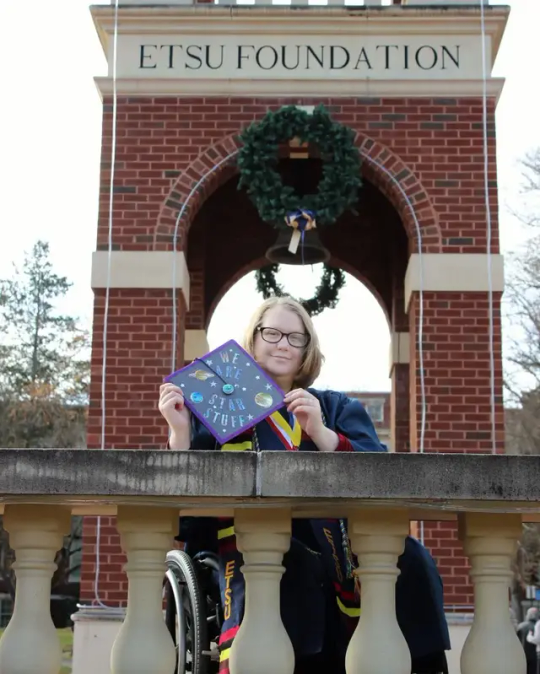
Person with glasses and blonde hair is sitting in a wheelchair, wearing university graduation regalia. They’re sitting on a balcony with a clocktower behind them, and holding a decorated graduation cap. The cap says “we are star stuff,” with a space theme.
Seven years.
Over seven years ago, I started college – expecting to graduate in May 2019. Like all best laid plans, that didn’t happen.
_
The past seven years has been… an adventure, to put it mildly. When I first stepped foot on my college campus, life looked a lot different. I originally chose to major in psychology, but quickly discovered that I didn’t quite “fit in” with the classes.
Meanwhile, my health took a complete nosedive. Multiple medical withdrawals, a transition from walking unaided to needing a wheelchair – these were things that I did not expect or plan for at all. I found that a lot of the medical issues that were dismissed growing up were signs all along, and that realization was a journey in itself. I learned that things that I found “normal” were very much not, both in regards to health and in childhood trauma.
Diagnosed with genetic disorders and several chronic illnesses was definitely not on the radar for me, nor did I anticipate my ridiculously bad luck with head injuries. The cognitive decline related to the traumatic brain injuries has been a hard one to navigate, and the aphasia exacerbated every communication struggle I already had.
The passing of my youngest brother was a shock to the system – and is something I still haven’t fully recovered from, nearly five years later.
The nights when existing was too hard, and I wanted to give up.
It’s been a long seven years.
_
But in these seven years, I learned how to navigate situations that I never expected.
I crossed the Atlantic alone for the first time to meet my sweet Christopher – and he asked me to marry him.
I learned that I had never been broken or bad at being human; I had been autistic all along – something that a lot of people apparently already knew.
I found myself somehow launched into the world of advocacy – founding an organization on campus, running a community center, coordinating vigils and protests, meeting with representatives in DC, and presenting at conferences. I wrote articles and Op-Eds, guides and posts – things that even somehow got published.
I formed close friendships and made memories I never thought I would – road trips, concerts, adventures, and those late night group discussions.
I learned how to “adult” somewhat (or at least learned how to bluff).
I learned how to conduct research, how to construct academic articles and research proposals, and how to write a thirty page paper without panicking too much.
And – I graduated Magna Cum Laude and as a Ronald E. McNair scholar.
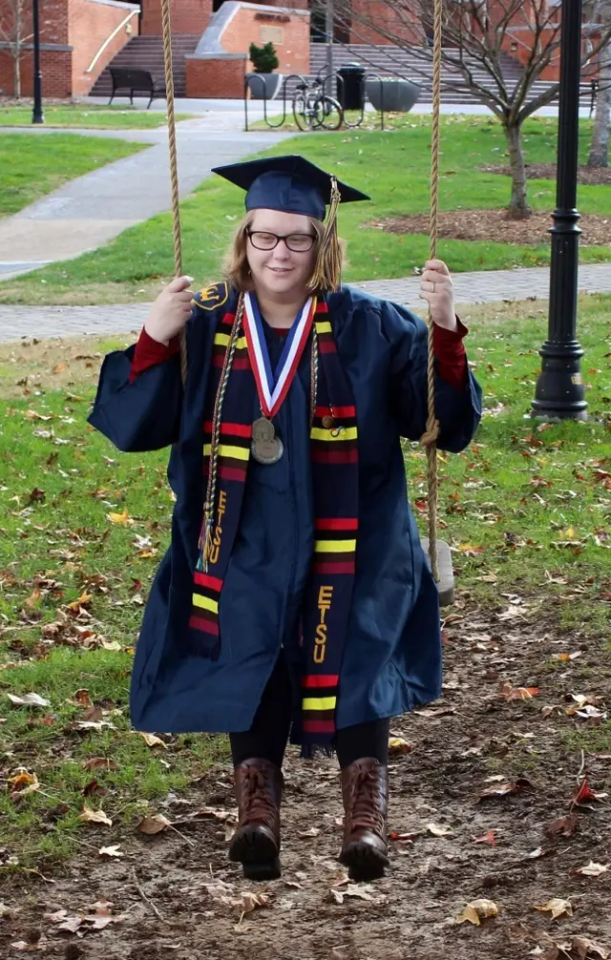
Person with blonde hair and glasses is wearing a blue graduation cap, gown, and regalia. They’re sitting on a swing and smiling.
I couldn’t have done it without the help of friends and loved ones.
The people who supported me as I learned how to navigate the world, the friends who sat with me in countless ER and hospital stays, the ones who were patient and understanding with me over the years.
I am so grateful for so many people.
_
It’s been a hard seven years, but I wouldn’t trade it for anything.
-Courtney Johnson, @justkeepstimming
0 notes
Text
Interdependence
When you graduate from high school, there’s a lot of emphasis on independence. The focus was always held on life skills like being able to drive, navigating post-secondary systems, and how to live alone.
When I first went to college, I was told that I wouldn’t even make it the first semester – because I wasn’t “independent enough.”
I didn’t check all the boxes that were expected by my age. Things like knowing how to drive, making friends, or understanding personal safety? The things that other people seemed to do so easily, I struggled hard – and I ended up in some very rough situations because of it.
My developmental profile has always been uneven, a common trait for a lot of us autistics.
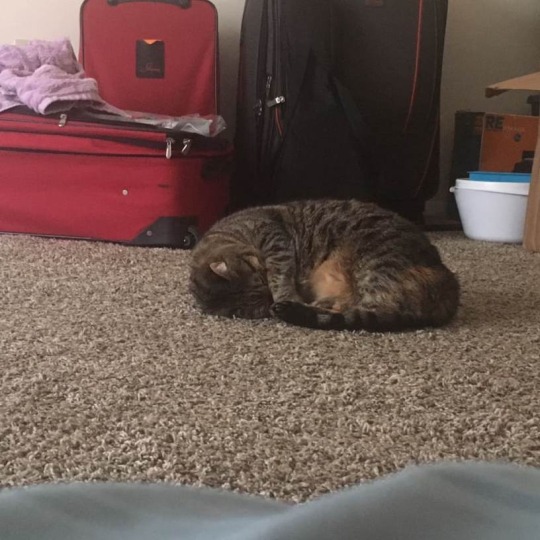
[A photo of a large tabby cat curled up in a floor, surrounded by boxes and old suitcases. This photo was taken when I first moved into an apartment and slept on the floor.]
A lot of the “adulting” skills I’ve learned have been formed over time and circumstance.
But most of all, these skills were forged through interdependence.
Loved ones who patiently sat with me as I learned how to navigate campus and those typical “adulting” skills.
People who helped me move from place to place, and taught me how to handle aspects of dorm/apartment living.
Those who brought me dinner on holidays that I would have otherwise spent alone.
Friends who guided me through scary situations, and those who taught me ways to keep myself safe.
Those who helped me figure out support systems, and the amazing direct support professionals who provide them.
Without these people, I would not be here – let alone have been able to graduate from a university.
_
We might like to think of ourselves as “completely self-made,” but honestly?
I don’t think it’s quite possible. In some capacity, everyone relies on someone else.
It’s not a moral failing to need help or supports, and it’s okay if things take more time for you to understand or do.
That’s what community is for.
- Courtney Johnson, @justkeepstimming
4 notes
·
View notes
Text
Autism and Epilepsy
Here’s your friendly reminder that autism and seizures sometimes go hand in hand. Not always, but sometimes it does.
Had an ambulatory EEG this past week, and I was very annoyed at it. I thought it wouldn’t show anything, and it wasn’t worth the sensory nightmare for three days. Not really something I was excited about, but I pushed through it – trying to figure out ways to keep my sensory system regulated. My weighted blanket was a lifesaver for this one.
I haven’t been feeling very well, but shrugged it off because I have things to do. I figured since I was taking my seizure medication, I should be good. Right?
And then yesterday, we got a call from the neurology office.
Turns out it was abnormal – and I also had a 20 minute episode. They want me to come in to see the doctor, so they can discuss all of the results with me.
I guess maybe that explains why I’ve been so disoriented and tired lately. I’ve been a lot more overwhelmed and dysregulated – and it shows.
_
Sometimes our “behaviors” are actually because of medical reasons. It can be hard to explain how we’re feeling, and it can also be hard to realize that something is wrong too.
Professionals don’t always realize this, and push families to “fix” the behaviors – instead of taking the time to rule out health issues.
A kid hitting their head? Could be migraines, post-seizure, an ear infection – or maybe even flashbacks from trauma.
Toileting troubles or accidents? Urinary tract infections, incontinence medical conditions, and GI problems can all play a role in it. Not to mention interoception!
Not paying attention or daydreaming? Sometimes that’s actually an ‘absence’ seizure.
And when it comes to families trying their best to figure out what’s happening? The system is complicated.
It can be hard finding specialists who understand autism, getting insurance to cover it, and doctors that take your concerns seriously. Parents have to deal with gaslighting, accusations of overreacting, and more.
And when you’re autistic yourself?
They take you even less seriously, especially when we have trouble explaining how we feel and what’s wrong. We’re seen as “unreliable narrators” or incompetent of understanding our own bodies and brains.
The medical field definitely has some work to do.
-Courtney Johnson, @justkeepstimming
0 notes
Text
Flower Communion
Earlier this month, my caregiver and I went to a local friend’s Unitarian Universalist church – where we were able to participate in their yearly tradition of the flower communion.
During the ceremony, everyone brings a flower and places it in a basket or vase. After a small reflection, everyone returns to receive a flower different from what they placed. This tradition was started by Norbert Čapek in 1923.
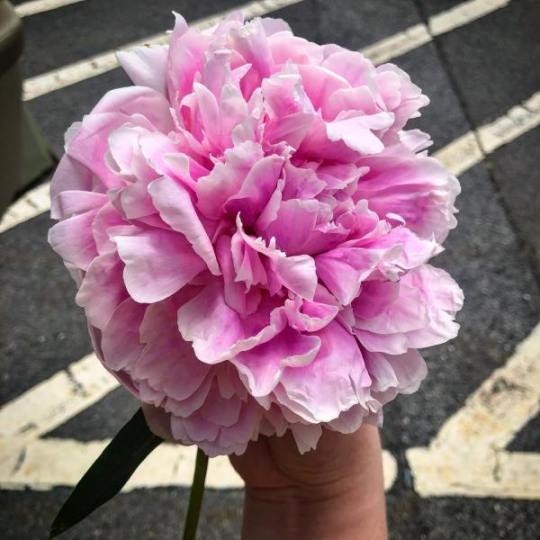
A pink peony flower is being held. You can see lines from a disability parking spot in the background.
As I held my flower, I studied it with my senses. I am autistic after all, and my sensory system helps me take in each moment.
The fragrance, softness of the flower itself, the strength of the stem – it gave me great joy.
After the service, it amused me to see all the petals that had fluttered to the ground. It was a gentle reminder to enjoy being in the moment. Flowers aren’t around forever, but the joy they give us while they’re here is wonderful.
Čapek himself understood this well. Arrested and sent to a concentration camp due to his writings and listening to “outside” news during WWII, he took solace in his ideals and in peace. His writings were interwoven throughout the service.
For myself, the most impactful refrain was this: “My life was worth living.”
And indeed it was.
_
Growing up, I had a lot of trauma connected to church and religion. Because of that, I was a bit scared to attend. When I went in though, I immediately felt at ease. Turns out Unitarian Universalism is very different from any “church” I’ve ever experienced before – and far more affirming. The emphasis on acceptance and value of all life (regardless of background, race, gender, sexuality, etc) was incredibly soothing.
Watching the pure celebration of life and its cycles is something wonderful.
0 notes
Text
Kids
The weather was lovely and sunny the other day, which meant picnic in the park! My caregiver brought some chalk and bubbles with us – and a lot of the children there (and parents!) decided they wanted to join in.
None of the kids were bothered by me using AAC, or even my wheelchair. In fact, they were fascinated with my assistive devices.
When I go out in public, I never know how people are going to react to my AAC device or my disabilities in general.
Often, there are stares – some out of curiosity, others out of pity or annoyance. Sometimes people whisper and point, as if I somehow don’t notice.
Today, that wasn’t the case.
_
I had children come up to me and ask if my “computer” can say the word dinosaur, and ask for the computer to tell them my name. I had kids come up to me and show drawings they had made for me.
Instead of wondering what was wrong with me, they were more interested in just being in the moment – enjoying a simple sunny day at the park.
It didn’t matter to them that I didn’t speak. Instead, they were more excited about some of the tricks I did in my wheelchair, and beamed with pride when I complimented their chalk art.
_
The part that stuck with me the most was something a little girl said at the end of the day. As I typed to say goodbye, she stopped her mom who was walking away – and said “wait, she’s typing something!”
This is something that I can’t even seem to get some professionals to grasp. The concept of waiting for me to communicate? They find it burdensome. They want to rush the interaction, moving off before I’ve finished typing or simply ignoring what I say.
_
If young children can grasp the idea of inclusion and acceptance, why can’t the adults?
It makes you wonder how disability becomes stigmatized.
Where does that radical acceptance go?
And how do the adults get it back?
-Courtney Johnson, @justkeepstimming
82 notes
·
View notes
Text
The Sloth
One of my favorite things is stuffed animals and plushies.
Squishmallows, teddy bears, and even pillow pets – if it’s soft and cuddly, I will love it.
Anytime we go to the store, I’m immediately drawn to the soft texture of any stuffed animal I see – which gives me a sense of calm in the middle of a chaotic environment. The feeling of the fibers twirled between my fingers, the way the softness seems to soothe my soul – it’s such a sensory comfort.
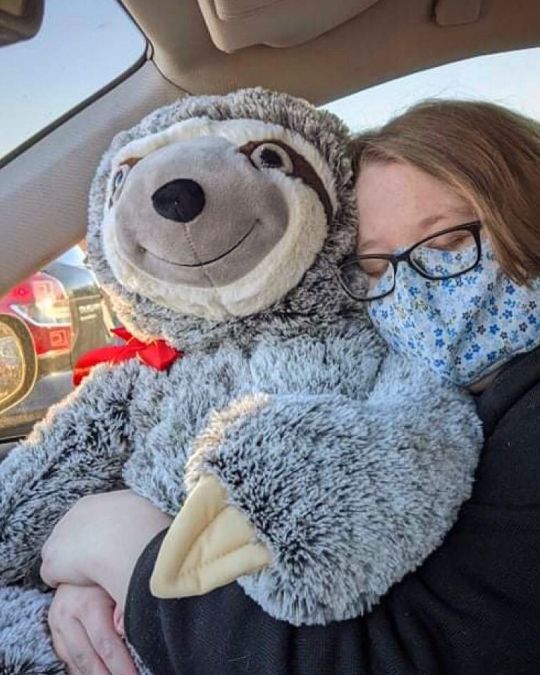
[Person with blonde hair and glasses is wearing a mask with blue flowers and a black jacket, and sitting in a car. They’re hugging a very large stuffed toy sloth, who has a red ribbon on him.]
I do the same with cozy blankets or pillows I see as well. The textures feel peaceful – like the physical embodiment of the meditation music I listen to every day when my brain feels stressed.
People don’t always understand the importance that stimming and sensory systems play a role in our mental health and joy, but it really does.
Sometimes we’re seen as childish for loving the things that we do, or for moving the way our bodies need us to. It’s not “age appropriate” or will somehow hinder our development.
I don’t think that’s true.
_
Our interests become comforts, springboards, or passions. Our movements regulate, express, and sometimes are not something our brains can control.
I navigate the world through my senses, feeling everything at an intensity that many people do not.
There is no shame in needing comfort. If a special interest or a sensory tool is what brings you peace in a troubled time, it’s okay to love what brings you joy.
Happiness has no age limit.
-Courtney Johnson, @justkeepstimming
0 notes
Text
The Simple Joys of “Too Much”
Something that I was often confused by growing up was people’s disinterest in things I found fascinating, interesting, or even beautiful.
I was thinking about this the other day, as my caregiver was discussing something – but I was far too distracted by the weeds on the side of road.
The way they were swaying to the breeze of the passing cars, their bright colors contrasting against the grey highway and the green grass – it just gave my heart such joy to see that I got to experience them before they were cut down.
I don’t know if it’s my ability to zero in on the smallest of details, the hyper empathy kicking in, or what it is – but my brain has an uncanny way of seeing the beauty or joy in some of the most mundane of things.
I tend to find happiness in the little things, even when dealing with inconveniences.

[Oil spill in the parking lot, resembling a rainbow swirl.]
Oil spill in the parking lot?
You’ll have trouble pulling me away from the beautiful colors. Forget chores; look at those swirls, how they intertwine within each other and push against.
It reminds me of how people’s lives are so intermingled with one another, each one impacting another – even if they never meet.
(I’ll still panic later about the environmental aspect, though.)

[A rainbow cast onto the wall by a CD’s reflection.]
A CD reflection on my wall?
I’m not moving anytime soon. Isn’t that so wonderful to see all the lights! I get a rainbow without any rain, and it’s like my own little prism.

[A bright blue bay of water with a blue sky above, taken from above on a pathway at Scarborough Castle.]
Passing through the Scarborough castle tour in 2016 to see a bay that everyone else has seen?
No, it’s a sensory epicenter and I need to take it all in. I’m breathing in the smell of the air, the realization that I had survived all those years to that very moment – tightly holding my fiancé’s hand to keep me steady as the sound of seagulls flew above our heads.
My soul needs to take in the blue of the sky, all the possibilities of creatures hiding under the waves, the lives of those walking down the beach…
The castle itself is rich in history. Think of the stories those stones could tell – I got overwhelmed thinking of all the trauma that could’ve been etched into those walls.
I might not speak, but I can feel everything – and I feel it intensely.
The smallest things can give me immense joy: a beautiful leaf, a rock, a snoozing pet in a window.
I imagine the lives they lived or the things they’ve seen, whether literally or figuratively – wondering what experiences shaped them to where they are today. I take both happiness and solace in knowing I exist at the same time as others I care about, wriggling in excitement when I see others having a good day or expressing happiness. I am content in the sound of cat purrs, the wag of a dog’s tail, the acknowledgement from animals who will sit near me even when they don’t know me.
I love joy and adore the simple things.
But the simple things can also fill me with grief, sadness, fear: a place where terrible things have happened, seeing someone with distress, hearing and sensing the anger of others.
A grieving sigh, footage on the news, the sound of racing footsteps down the hospital hall after a code blue is announced – I’ve never been able to desensitize myself to others’ distress. I was banned from watching the news as a child for a bit because of this; I would cry at every story, because I couldn’t do anything to help.
I can feel it all, and I cannot turn it off.
For better and worse.
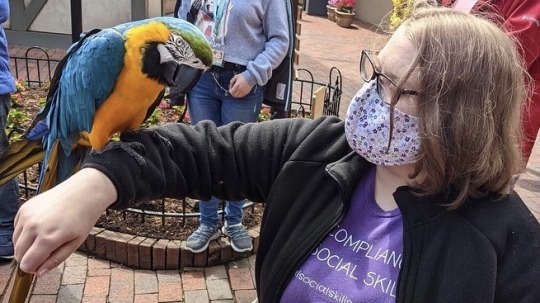
[A person with messy blonde hair and a flower mask is sitting in a wheelchair outdoors. There is a colorful bird sitting on their arm. Behind the mask is a very happy and content Courtney.]
People often ask why we as autistics stim and move, and why we cannot simply comply.
Truth be told, it’s because my brain and body cannot comply, nor does it even need to. I exist in my own space where my brain and body are interconnected and disconnected all at once – while speech doesn’t connect like it used to due the brain injuries, all the emotion and energy flows freely through my sensory systems that I cannot contain. Sometimes it can overwhelming, but sometimes it can be beautiful.
No wonder my body demands I move and stim! To not allow myself to move goes against nature itself, for energy cannot be extinguished. I absorb and sense it all, and I must react. To not react is painful for me, and denies the very acknowledgement of life’s many experiences.
The world is simply so much, for better and worse.
- Courtney Johnson, @justkeepstimming
https://justkeepstimming.com/2021/08/16/the-simple-joys-of-too-much/
11 notes
·
View notes
Text
April is Autism Acceptance Month!
For me, acceptance is more than just a word. It’s an action.
Acceptance is inclusion. It’s home and community based services. It’s supported decision making. It’s autistic space, joyful stimming, helping navigate supports, fixations on the beauty of sunlight beams coming through the window - and knowing you’re safe to experience that world around you.
Acceptance is representation and the uplifting of voices of autistic people who are even further in the margins - especially BIPOC autistics, nonspeaking autistics, and so many others. It’s recognizing that the roots of the disability rights movement are intertwined with the fight for freedom for and by people with intellectual and developmental disabilities.
Acceptance is knowing that being autistic doesn’t mean we’re “broken”. Changing the world for the better and accessible, not changing us to fit what the world wants us to look like.
Awareness is passive, with its dehumanizing puzzle pieces and overwhelming blue lights.
But acceptance? There’s a good start.
11 notes
·
View notes
Text
All About AAC: A Guide to Augmentative and Alternative Communication Options!
#aac#nonspeaking#nonverbal#aac user#just keep stimming#augmentative and alternative communication#disability#long post link only
18 notes
·
View notes
Photo
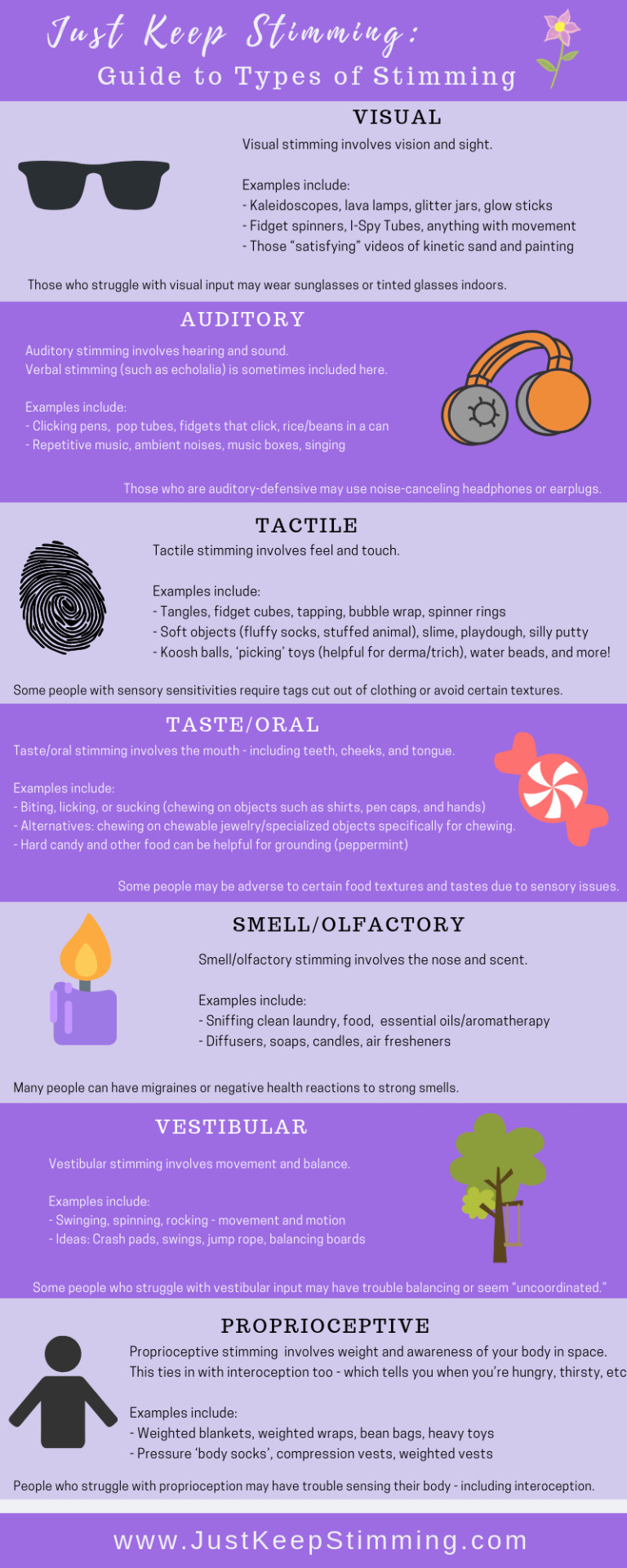
Guide to Types of Stimming
Source: https://justkeepstimming.com/2019/05/21/types-of-stimming-infographic/
6 notes
·
View notes